Podcast
Questions and Answers
What is Marx's View of History and Society?
What is Marx's View of History and Society?
- A history of political revolutions
- A history of technological advancement
- A history of cultural achievements
- A history of class struggle (correct)
What are the two main classes in modern bourgeois society?
What are the two main classes in modern bourgeois society?
Bourgeoisie and Proletariat
The executive of the modern state manages the common affairs of the proletariat.
The executive of the modern state manages the common affairs of the proletariat.
False (B)
What did the bourgeois revolution end?
What did the bourgeois revolution end?
In place of local self-sufficiency, capitalism promotes ______ among nations.
In place of local self-sufficiency, capitalism promotes ______ among nations.
What are the political implications of urbanization according to Marx?
What are the political implications of urbanization according to Marx?
How do recurrent commercial crises impact bourgeois society?
How do recurrent commercial crises impact bourgeois society?
What does the term 'proletariat' refer to?
What does the term 'proletariat' refer to?
What happens to the middle class with the rise of modern industry?
What happens to the middle class with the rise of modern industry?
Workers form unions to strengthen their collective bargaining power against employers.
Workers form unions to strengthen their collective bargaining power against employers.
What should the proletariat aim to destroy according to Marx?
What should the proletariat aim to destroy according to Marx?
What role does the ruling class play during a revolution?
What role does the ruling class play during a revolution?
Flashcards are hidden until you start studying
Study Notes
Marx's View of History and Society
- History revolves around class struggle and relations of oppression between the powerful and the less powerful.
- Significant epochs are marked by revolutions that change power dynamics within society.
Class Relations in Historical Context
- Ancient Rome's class structure included patricians, knights, plebeians, and slaves.
- Medieval Europe featured classes such as lords, vassals, guild-masters, journeymen, apprentices, and serfs, indicating hierarchical relations.
Current Social Class Structure
- Modern society is simplified into two primary classes: the bourgeoisie (ruling class) and the proletariat (working class).
- The bourgeoisie represents the wealthy middle class, while the proletariat includes those who work for a living.
Role of the State
- The modern state acts as a management committee for bourgeois interests.
- Executives function as "viziers," serving to maintain the bourgeoisie's power and authority.
Impact of the Bourgeois Revolution
- The bourgeois revolution dismantled feudal and patriarchal ties, establishing a sense of equality.
- It empowered both men and women to envision upward mobility in society.
Consequences of Capitalism
- Capitalism prioritizes self-interest, leading to vast exploitation and the commodification of relationships, including familial ties.
- This system promotes universal freedom that paradoxically allows for the destitution of many.
Industrial Relations and Production
- Unlike previous epochs, the bourgeois age involves constant upheaval in production methods to maximize profit.
- Industrial changes result in job insecurity as automation increases, requiring workers to adapt to new technologies.
Globalization Effects
- Industries now transcend local boundaries, fostering interdependence and reducing nationalistic mindsets.
- Global capitalism encourages equality in theory, though prejudices still persist on a smaller scale.
Urbanization Dynamics
- Population concentrations in urban centers arise from the demand for unskilled labor in factories.
- Political power is increasingly centralized in urban areas where industrialists dominate.
Economic Crises
- Bourgeois society faces recurring crises due to excess civilization, industry, and commerce.
- These crises stem from the relentless pursuit of profit and market expansion, leading to systematic economic instability.
Proletariat Formation
- The shift from master workshops to capitalist factories creates a workforce dependent solely on labor for survival.
- Proletarians become disenchanted as their labor loses individual significance and value under capitalist demands.
Growth of the Proletariat
- Economic pressures push lower middle classes into the proletariat, consolidating and strengthening their ranks.
- The concentration of laborers entails a leveling of wages and conditions, diminishing middle-class stability.
Collective Action and Resistance
- Workers organize trade unions, challenging bourgeois authority and seeking better wages.
- Collective identity emerges among workers, empowering them to negotiate and threaten strikes against employers.
Path to Revolution
- As class conflicts escalate, factions within the ruling class may ally with the revolutionary proletariat, intensifying the struggle.
- Open revolutions erupt when the ruling class exhibits internal fractures and discontent.
Vision of a Classless Society
- The proletariat aims to dismantle all forms of private property that reinforce social hierarchies.
- Future power dynamics will be dictated by wealth, as revolutions create new pathways for social leadership and influence.
Studying That Suits You
Use AI to generate personalized quizzes and flashcards to suit your learning preferences.




